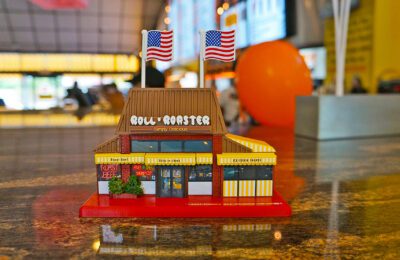How I Tried to Become a Vegan (and How You Can, Too!)
Neither of us had eaten butter in we-couldn’t-remember-how-long that we couldn’t even identify it as an ingredient. For me, it was because I try to keep vegan. I’ve been eating that way since March 2011, which is when, according to Goodreads, I finished eating animals, I mean Eating Animals, a book I actually don’t like that much, and wouldn’t really recommend—there are better books on the topic—but which nonetheless forced me, because I happened to be reading it, to confront the living conditions of dairy cows and egg-laying hens. I had been a vegetarian for moral reasons before that, since, geez, I don’t remember that either—summer of 2005? And if I wasn’t going to eat meat because of how the animals were treated, I couldn’t anymore justify to myself eating their eggs and drinking their milk.
I had stopped eating meat in college because I was surrounded by good influences: friends and bartenders who gave me the intellectual framework to justify the decision and the living proof to encourage me. Though I’ve met people who eat meat morally—well-fed and well-treated animals from small farms, that sort of thing—I can’t imagine someone eating meat for moral reasons, so I won’t get too into those things I learned about the miserable conditions in which 98 percent of our animals are born and raised and killed, nor the unfathomable cruelties meted out as a matter of course to creatures often as smart and sociable as the animals we protect as pets. If you’ve ignored these arguments thus far, well, why listen now? To, of all people, me? (Well, ok, maybe just one, like this recent testimony from a Tyson hog farmer: “I… saw workers violently slamming piglets headfirst into the concrete and leaving them to suffer and slowly die. Some of the piglets were spiked against the ground like footballs. I found one piglet still conscious and breathing in a pile of dead piglets. Nobody bothered to make sure she was dead before just throwing her away.”)
And anyway, for the record, I still don’t think it’s inherently immoral to eat meat: I understand the food chain, but I also believe what sets us apart as humans is our ability to reason ourselves outside of it, that the standard query should be spun around: it’s not, “Why shouldn’t I eat meat?” but, “Why should I?” Which is a question, as a New Yorker living in the 21st century with easy access to copious healthful alternatives, I can never answer for myself, so I adjust my diet accordingly. You do that long enough and it becomes your new normal; you barely ever even think about it.
But back in my early days, in what I think was 2005, it was still a daily decision. I started eating days-on/days-off, falafels on Monday but gyros on Tuesday, until a friend who had also just gone veg asked me, why not just stop altogether? Like, not rhetorically—literally why not? And, again, I didn’t have an answer, so I stopped. For a few months I went pescetarian, ordering shrimp and broccoli from the Chinese place, until eventually I just started ordering broccoli.
Speaking of Chinese food, you know, I don’t know what’s in the brown sauce? (I’m sure someone will ruin Chinese food for me by telling me in the comments.) Earlier, when I wrote that I try to keep vegan, what I meant is that I’m imperfect. It’s not that I order eggs at the diner if I feel like it, but that I don’t interrogate the counter staff at my local Panda Inn, nor the waitstaffs at Court Street bistros, about the ingredients in their tofu-and-broccoli or quinoa-salad sauces. Sometimes this means a dish may come bearing butter, and I’ll wince and eat it and ask myself to be more careful next time.
I know I come up short of the ideals I set for myself—the last shoes I bought were made of leather!—so I usually don’t advertise myself as perfect, just as someone who tries, the same way (almost) all of us try in general to be good people. Too often we get hung up on labeling our diets and our selves; the way us vegetarians define ourselves against the typical Western diet, so too do the omnivores come to define themselves in opposition to the radical vegetable-eating fringe.
I’m irked whenever I hear someone with a troubled conscience excuse their meat-eating by saying, “I could never be a vegetarian.” Of course you could—we can all do anything, especially tweak the list of things we eat, as long as it actually matters to us. But more to the point, you don’t have to identify as vegetarian if you really think there’s something wrong with eating meat. You can eat that way sometimes but not eat that way other times, even over the course of a single day, and still be doing something helpful. After all, nobody’s perfect, and we should never let the perfect be the enemy of the good—especially when lives are at stake. If you want to give up meat or eggs or dairy, go ahead and try. And if you fail? Just try again, and again, and again—and maybe one of these days we’ll get it right.
You might also like 



















